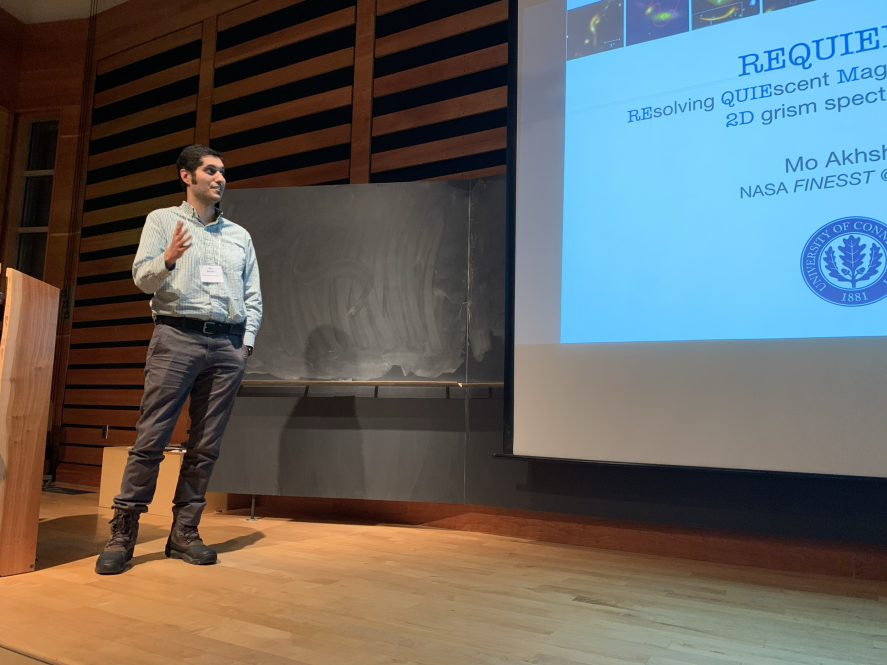When he was about 15 years old, physics Ph.D. candidate Mohammed (Mo) Akhshik read a collection of articles written by Fields Medal recipients that set him on a path to study science and ignited an interest in mathematics.
Math lead to physics and physics lead to cosmology, and eventually his studies brought him UConn.
“It was a long journey, in a step-by-step kind of way,” Akhshik says. “At first, physics was a little bit tough and I wasn’t really good at it, but after a while I got more comfortable with the physical concepts, and eventually I got very interested in physics. Later on when I was doing my master’s thesis, I took a cosmology course and that’s what got me interested in space.”
At UConn, he continued his studies in the lab of Katherine Whitaker, now at the University of Massachusetts Amherst.
Akhshik’s work has focused on data gathered using the Hubble Space Telescope (HST) and has led to exciting discoveries, some while he served as the science Principle Investigator of the REQUIEM HST program from which he is co-author on two publications, one in Nature and one in Nature Astronomy. Akhshik is also a recipient of a national fellowship as a NASA FINESST Future Investigator.
The researchers are able to glean new information because the images appear brighter due to a phenomenon called gravitational lensing. Also, due to the forces of gravity, the images appear in different parts of the sky at different times, explains Akhshik. The researchers were also able to detect new details of distant galaxies through observations from different telescopes, which Akhshik says is almost like layering different filters on the same image.
“So in each one of the filters, you’re looking at this specific wavelength, it’s like taking an image in green, in red, or in blue, the galaxy will look different and we will learn something new by observing in each filter.”
Akhshik is currently wrapping up a few things before completing his studies later this year, including another paper, but he is also looking at the next chapter in his pursuit of knowledge.
“I’m currently looking for jobs in academia and beyond and am hoping to find a position either in quantitative finance or data science, which are typical industries for physics graduates,” he says.
The skills needed for studying the complexities and dynamics of galaxies and stars translates well to studying data-intensive processes on Earth.
“The general idea is that physicists usually are good with the mathematics, and they’re usually good at coding and problem solving. They naturally fit into those industries because there is a quantitative data, so physicists fit right in there.”
Akhshik says one thing he really cherishes about his Ph.D. experience is collaborating with other researchers:
“And this is something that I really, really love about being in astronomy. The science is always cool but people are actually more important to me and I have very, very lovely collaborators and my advisor who I know I can always get help from. They are always nice and friendly, that’s why I love being here, besides, of course, the science.”
With his time at UConn drawing to a close, Akhshik reflects on how it was a great fit and a place that he will miss — except for the winters.
“It’s a really supportive environment,” he says. “Especially if you just want to have a quiet life and focus on the research. I love Storrs and I love being at UConn. It’s great usually, if it’s not wintertime, but especially the spring. I’m excited, but it is also bittersweet because I have to say goodbye to UConn and all my friends.”
Wherever the journey leads him next, Akhshik hopes to keep in touch with his astronomical roots.
“It’s a fun fact that I have never actually owned a telescope, but maybe now I’ll get one,” he laughs. “In terms of research, of course, it’s very hard to keep track of all the nitty gritty that is going to happen, but I hope I can continue to follow the big picture stuff.”



